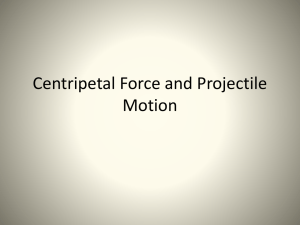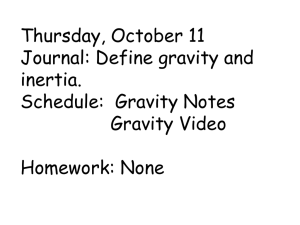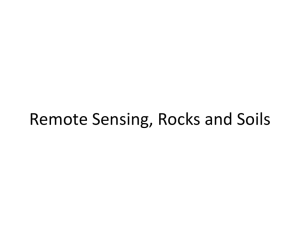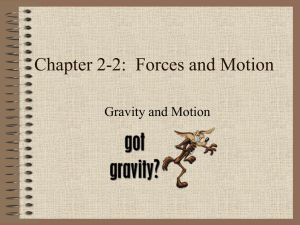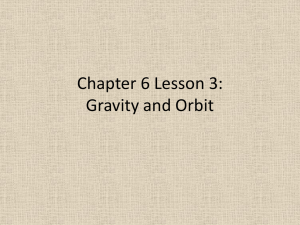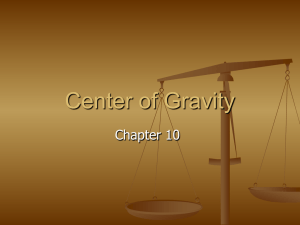Chapter 10 Center of Gravity
advertisement
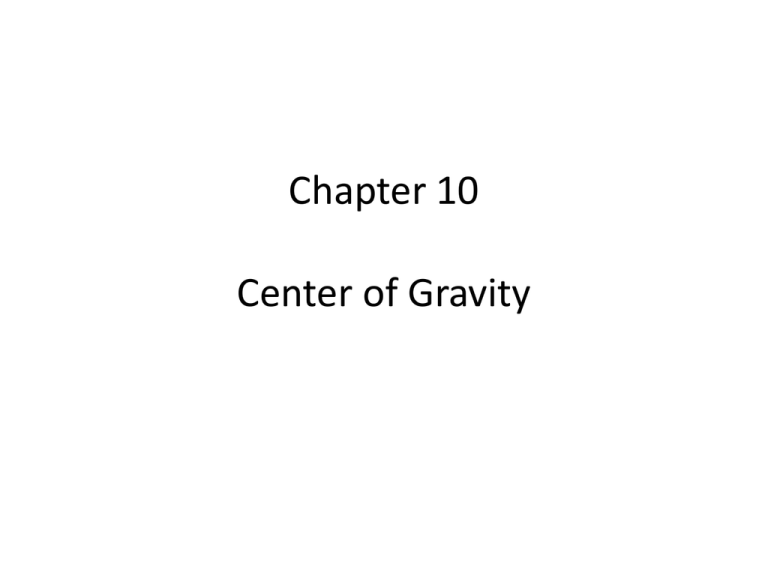
Chapter 10 Center of Gravity Center of Gravity – Is the point located at the object’s average position of weight For symmetrical objects, such as a baseball, the center of gravity is at the geometric center of the object. Consider the following objects and their center of gravity: The center of gravity may be located where no actual material exists: Q: Where is the center of gravity of a donut? A: In the center of the hole. Q: Where is the center of gravity of a basketball? A: In the center of the basketball. Q: Can an object have more than one center of gravity? A: Yes! A rigid object has one CG. If it is nonrigid, such as a piece of clay or putty, and is distorted into different shapes, then its CG may change as its shape is changed. Even then, it has one CG for any given shape. Center of Mass The center of gravity is often called center of mass, which is the average position of all the particles with mass that make up an object. For almost all objects on and near the earth. These terms are interchangeable. “There can be a small difference between center of gravity and center of mass when an object is large enough for gravity to vary from one part to another.” For common everyday small objects, this difference is negligible. Extrasolar Planets Here is something VERY cool about center of gravity. You have always been told that the earth revolves around the sun right? Well this is not entirely true. The earth and the sun both revolve around a common center of gravity called the barycenter. However since the sun is 332,900 times more massive than the earth, the common center of gravity between the earth and the sun is located within the sun itself. As the earth revolves around the sun however, it still causes our sun to wobble around that point. Astronomers can detect the wobble of distant stars and can therefore infer the existance of planets around those stars. As of November 27th, 2012 the extrasolar planet encyclopedia lists 852 extrasolar planets. A binary star system: Common Center of Gravity A planetary system: Common Center of Gravity Locating the Center of Gravity “If you suspend any object (a pendulum, for example) at a single point, the CG of the object will hang directly below (or at) the point of suspension.” “You can locate the CG by suspending the object from some other point and constructing a second vertical line. The CG is where the two lines intersect.” Toppling: “The rule for toppling is this: If the CG of an object is above the area of support, the object will remain upright. If the CG extends outside the area of support, the object will topple.” – p. 140 The Leaning Tower of Pisa Interesting Facts: Construction: 1173 – 1372 Height: 56.70 meters Lean: 3.99 degrees The tower began leaning during construction, due to the foundation sinking into the soft ground beneath the tower. The tower does not topple over because the center of gravity is still above its support base. Unstable equilibrium – any displacement that causes the center of gravity to be lowered. Stable equilibrium – any displacement that causes the center of gravity to rise. Stable Equilibrium: Center of Gravity and Potential Energy: When the CG of an object is raised, potential energy is increased. When the CG of an object is lowered, the potential energy is decreased. PE = High PE = Low

